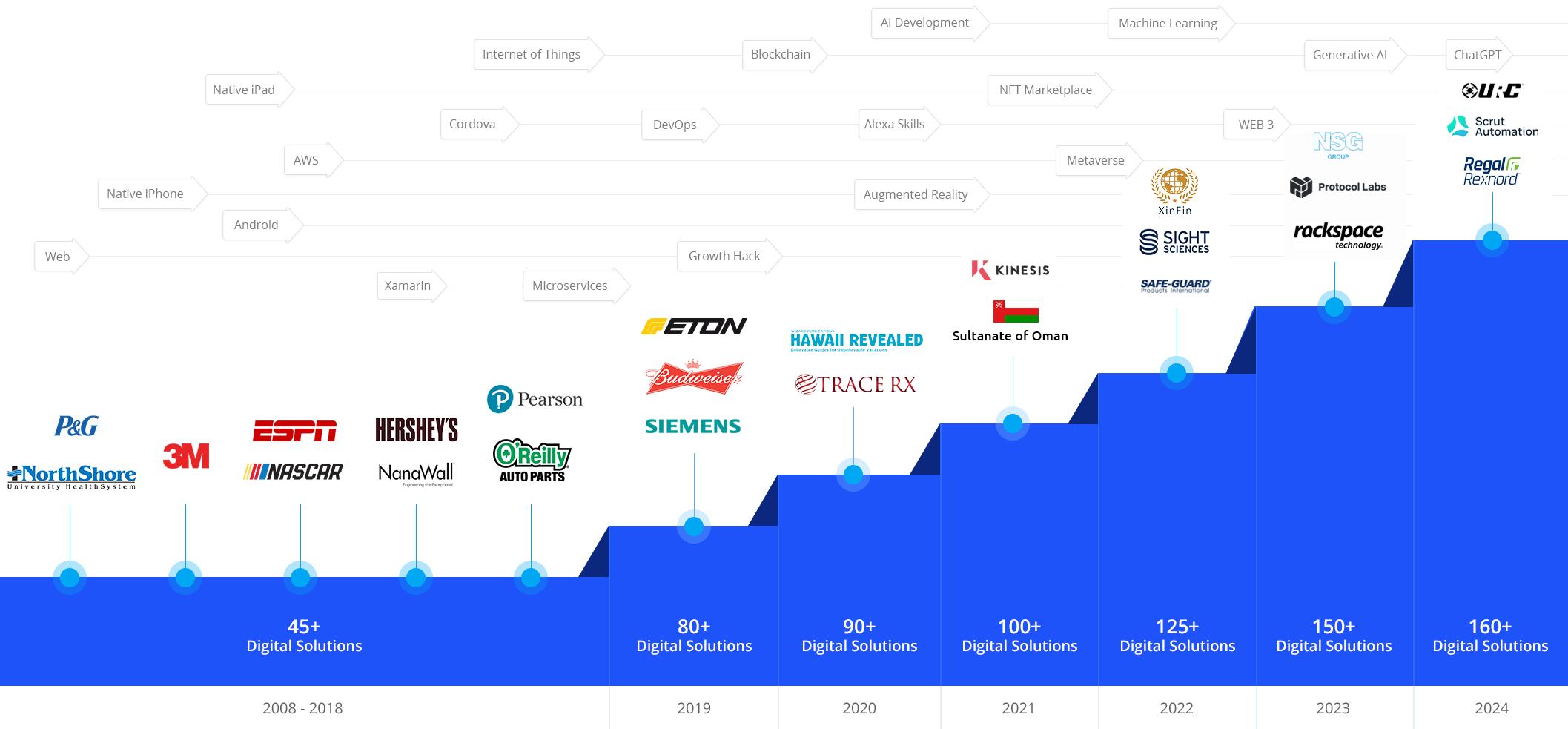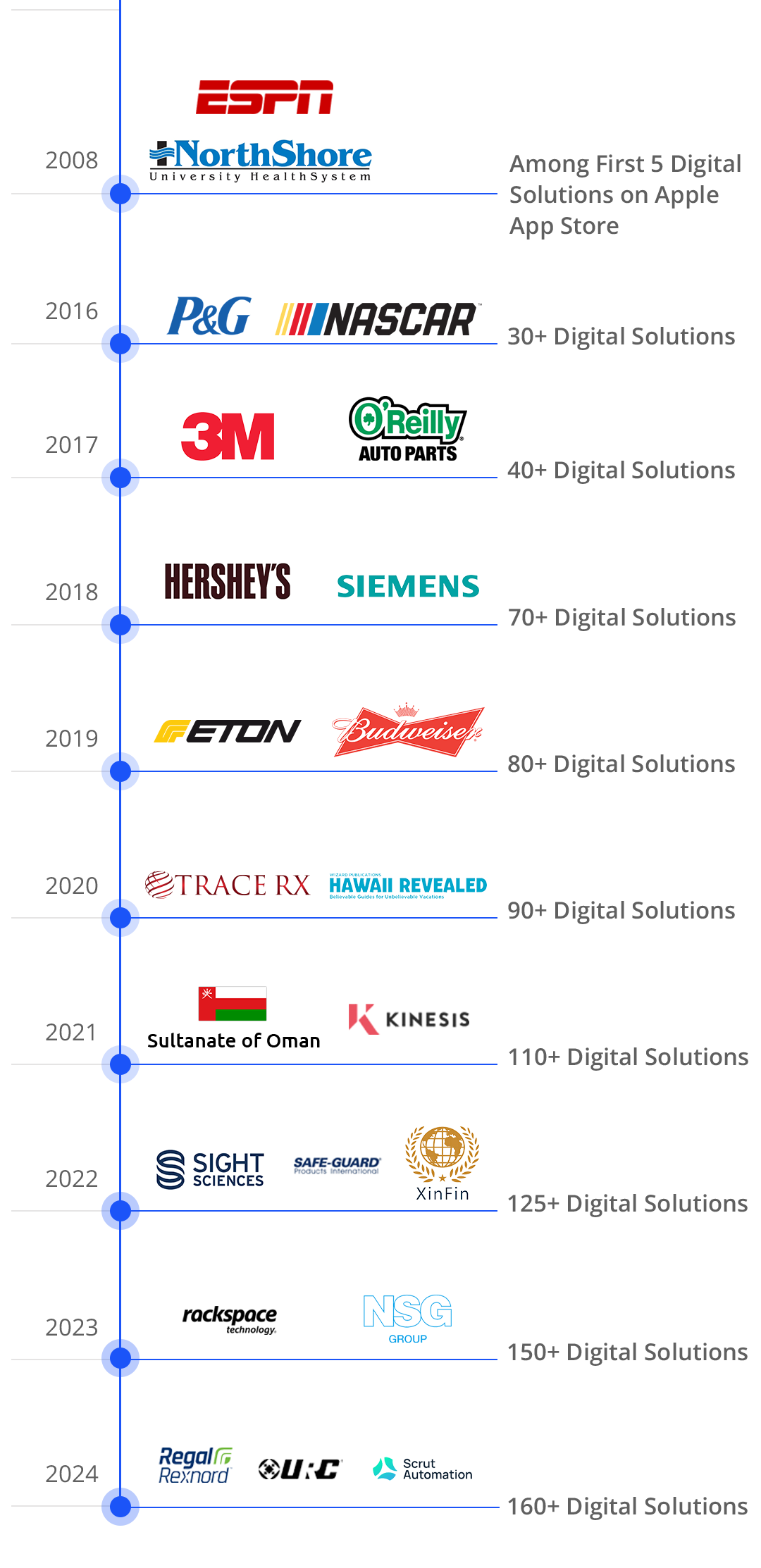Adaptive AI Development Company
Harness the power of adaptive AI to transform your business operations and improve customer satisfaction. With deep expertise in machine learning, deep learning, neural networks, NLP and other AI subsets, our adaptive AI developers build highly performant custom adaptive AI solutions.

Trusted By Leading Enterprises


AI Developers
Software Products Delivered
AI Solutions
Total Years of Experience
Our Adaptive AI Development Services
Consulting and Strategy Development
Custom Adaptive AI Model-based Solutions Development

Maintenance and Upgrade

Model Integration and Deployment
Data Engineering
Our Technical Expertise in Adaptive AI Development
Machine Learning
Deep Learning
Our developers have expertise in deep learning algorithms and their underlying neural networks like RNNs, CNNs, and long short-term memory (LSTM) networks that help adaptive AI models to learn data and make predictions automatically.
Natural Language Processing (NLP)
Our team of adaptive AI experts can incorporate Natural Language Processing (NLP) into your application for efficient sentiment analysis, text processing, and named entity recognition. NLP can also be utilized for developing chatbots and virtual assistants.
Computer Vision
With expertise in utilizing top-notch tools, frameworks and libraries like TensorFlow or PyTorch, our team develops robust computer vision algorithms and techniques, including image classification, object detection, segmentation and scene understanding.
Cloud Computing
Predictive Analytics
Our developers have expertise in developing adaptive AI-based solutions that use predictive analytics algorithms and techniques, including random forests, decision trees and gradient boosting, facilitating businesses to make data-driven decisions based on real-time data.
Our Adaptive AI Systems Development Process


Identify the Problem
The first step in developing an adaptive AI solution is to identify the problem you want to solve. This involves understanding the business need or user requirement that the AI will address, as well as any constraints or limitations on the solution.

Gather Data
Once you’ve identified the problem, you need to gather relevant data to train your AI model. This may involve collecting data from a variety of sources, including internal company data, public datasets, and user-generated content.

Clean and Preprocess Data
After you’ve gathered your data, you need to clean and preprocess it to ensure that it’s suitable for training your AI model. This involves removing duplicates, handling missing values, and transforming the data into a format that can be used by your model.

Develop and Train the Model
With your data cleaned and preprocessed, you can begin to develop your AI model. This involves selecting an appropriate algorithm or approach, tuning hyperparameters, and training the model on your data.

Validate and Test the Model
Once your model is trained, you need to validate and test it to ensure that it’s performing as expected. This involves evaluating the model’s accuracy, precision, recall, and other performance metrics, and making any necessary adjustments to improve its performance.

Deploy the Model
Once your model has been validated and tested, you can deploy it in a production environment. This may involve integrating the model with other systems, such as a web or mobile app, and setting up infrastructure to support the model’s ongoing operation.

Monitor and Update the Model
After your model has been deployed, you need to monitor its performance to ensure that it’s continuing to perform as expected. This may involve setting up monitoring and alerting systems and periodically updating the model to improve its performance based on new data or user feedback.
AI Models We Have Expertise In












Our Adaptive AI Systems Development Stack
AI Frameworks
Cloud Platforms
Integration and Deployment Tools
Programming Languages
Databases
Algorithms
Supervised/Unsupervised Learning
Clustering
Metric Learning
Fewshot Learning
Transfer Learning
Ensemble Learning
Online Learning
Neural Networks
CNN
RNN
Representation Learning
Manifold Learning
Variational Autoencoders
Bayesian Network
Autoregressive Networks
Long Short-term Memory (LSTM)
Our Artificial Intelligence Portfolio
LLM-powered Application for Safer Machinery Troubleshooting
LeewayHertz collaborated with a top-tier Fortune 500 manufacturing company to develop an innovative LLM-powered machinery troubleshooting application. This innovative solution streamlines machinery maintenance, elevates safety protocol adherence and mitigates operational risks of the firm. By seamlessly integrating static machinery data and dynamic safety policies, the application provides quick access to relevant information for troubleshooting issues while also enhancing safety with clear and detailed instructions on equipment handling.
Generative AI Application
LLM-powered App for Compliance and Security Access
Data Analysis
Geospatial Data Analysis
Generative AI Solution
GenAI-based Clinical Decision Support System
Our Adaptive AI-based Development Services Cater to a Wide Array of Industries
Big Brands Trust Us


As Mentioned in


Our Engagement Models

Dedicated Development Team
Our developers leverage cutting-edge cognitive technologies to deliver high-quality services and tailored solutions to our clients.

Team Extension
Our team extension model is designed to assist clients seeking to expand their teams with the precise expertise needed for their projects.

Project-based Model
Our project-oriented approach, supported by our team of software development specialists, is dedicated to fostering client collaboration and achieving specific project objectives.
Get Started Today
1. Contact Us
Fill out the contact form protected by NDA, book a calendar and schedule a Zoom Meeting with our experts.
2. Get a Consultation
Get on a call with our team to know the feasibility of your project idea.
3. Get a Cost Estimate
Based on the project requirements, we share a project proposal with budget and timeline estimates.
4. Project Kickoff
Once the project is signed, we bring together a team from a range of disciplines to kick start your project.
Start a conversation by filling the form
Once you let us know your requirement, our technical expert will schedule a call and discuss your idea in detail post sign of an NDA.
All information will be kept confidential.
FAQs
What is adaptive AI development?
Adaptive AI development refers to the process of building AI systems that can automatically adjust and improve their performance based on feedback from the environment or user interactions.
How is adaptive AI different from traditional AI?
Traditional AI systems are static and operate based on a fixed set of rules or algorithms. Adaptive AI systems, on the other hand, can dynamically adjust their behavior and learn from experience.
What are some examples of adaptive AI?
Examples of adaptive AI include recommender systems that learn from user behavior to make better recommendations, chatbots that improve their responses based on user feedback, and autonomous vehicles that adjust their driving behavior based on real-time sensor data.
What are the benefits of adaptive AI?
Adaptive AI can improve system performance, enhance user experience, and reduce the need for manual intervention or programming
Do you also sign NDA?
Yes, we can sign an NDA and ensure that your information is kept confidential.
What are some challenges of developing adaptive AI?
Challenges of developing adaptive AI include managing complex data sets, addressing issues of bias and fairness, and ensuring the safety and reliability of the system.
What is the future of adaptive AI?
The future of adaptive AI is likely to see continued growth and innovation, with applications in fields such as healthcare, finance, and education, as well as the development of more sophisticated algorithms and techniques for building adaptive systems.
What are some challenges of developing adaptive AI?
Challenges of developing adaptive AI include managing complex data sets, addressing issues of bias and fairness, and ensuring the safety and reliability of the system.
Insights
Generative AI for Regulatory Compliance: Benefits, integration approaches, use cases, best practices, and future trends
Generative AI is reshaping the field of regulatory compliance by enhancing risk management, boosting operational efficiency, and improving compliance monitoring.
Generative AI for marketing: Overview, use cases, integration strategies, and future outlook
Generative AI is transforming the marketing landscape by enhancing content creation, customer interaction, and data analysis.
Generative AI in due diligence: Integration approaches, use cases, challenges and future outlook
Generative AI is reshaping the due diligence landscape, establishing new data analysis and processing benchmarks.





























